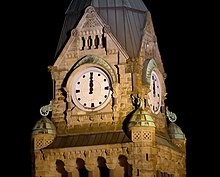
Back منتصف الليل Arabic وسط الليل ARY Chika aruma Aymara Gecə yarısı Azerbaijani Matanga BCL Полунощ Bulgarian Tangah malam BJN Mitjanit Catalan نیوەشەو CKB Půlnoc Czech

Midnight is the transition time from one day to the next – the moment when the date changes, on the local official clock time for any particular jurisdiction. By clock time, midnight is the opposite of noon, differing from it by 12 hours.
Solar midnight is the time opposite to solar noon, when the Sun is closest to the nadir, and the night is equidistant from sunset and sunrise. Due to the advent of time zones, which regularize time across a range of meridians, and daylight saving time, solar midnight rarely coincides with 12 midnight on the clock. Solar midnight depends on longitude and time of the year rather than on time zone. In ancient Roman timekeeping, midnight was halfway between dusk and dawn (i.e., solar midnight), varying according to the seasons.
In some Slavic languages, "midnight" has an additional geographic association with "north" (as "noon" does with "south"). Modern Polish, Belarusian, Ukrainian, and Serbian languages preserve this association with their words for "midnight" or "half-night" (północ, поўнач, північ, пoнoħ) also meaning "north".[1]
- ^ Wexler, Paul (1980). "The Byelorussian Impact on Karaite and Yiddish". The Journal of Byelorussian Studies. IV (3–4). Anglo-Byelorussian Society: 103. Retrieved February 3, 2021.